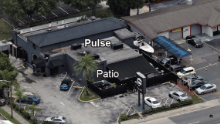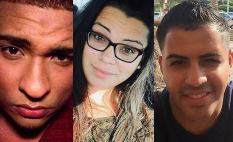MIAMI -- Law enforcement officials immediately suspected terrorism and adjusted their staging areas because of fears about an explosive device as they responded to reports of shots fired at a gay nightclub in Orlando, according to sheriff's office reports released Saturday.
In the reports, Orange County sheriff's office deputies describe receiving limited information about an "active shooter" as they rushed to control the chaos outside Pulse on June 12 in what turned out to be the deadliest mass shooting in modern U.S. history.
Sgt. David Legvold wrote that, as he assessed all the sheriff's office personnel and resources at the early morning scene, he was told by a superior that "this incident had been declared a National Special Security Event and should not be discussed outside the law enforcement community."
The U.S. Department of Homeland Security makes that designation for events deemed to be potential targets for terrorism, mass protests or other criminal activity. Pope Francis' visit to Philadelphia last year and this year's Republican and Democratic national conventions received this designation.
Legvold wrote that the commander of the sheriff's office Critical Incident Management Team informed him of the special security designation, but it wasn't clear where that information came from. A report by the lieutenant that Legvold identified as the team's commander was not released.
In a 911 call from the club where 49 people were killed and more than 50 injured, the gunman, Omar Mateen, pledged solidarity with the Islamic State militant group. Federal law enforcement officials have said there's no evidence Mateen was directed by any foreign terrorist groups.
Officials also said FBI investigators haven't found convincing evidence supporting reports that Mateen was gay or seeking gay relationships.
In another report, Deputy Johnerick Sanchez described helping victims exiting the club's entrance until authorities relocated an "inner perimeter" because of fears of a "possible improvised explosive device."
Sanchez then moved to the west side of the club, where he said he helped people escaping from the bathrooms and dressing room.
Other deputies wrote about responding to Orlando police calls for emergency backup in about 15 reports emailed by sheriff's office spokesman Jeff Williamson.
When they arrived, they saw people covered in blood and running from the club in a panic while others with gunshot wounds lay on the ground, according to the reports.
Deputies wrote about hearing gunshots from inside Pulse, separating the wounded according to the severity of their injuries and carrying people to paramedics and ambulances.
They rushed to lock down Orlando Regional Medical Center, where many victims were being treated, after erroneous reports about shots fired there. Deputies also held posts outside the club until police SWAT officers took over, corralled witnesses, searched nearby parking lots for possible explosive devices and blocked off surrounding streets.
The sheriff's office also was called upon to help identify some of the living and the dead in the shooting's aftermath. In one report, deputy David Scroggins wrote that he was called to the Orange County medical examiner's office and the Medical Center to help identify victims with his fingerprint reader.
Scroggins identified one wounded 31-year-old man who had been taken from surgery to the hospital's intensive care unit.
In the medical examiner's office, he tried to identify four victims but only could match fingerprints from one to a name. That was Edward M. Sotomayor Jr., a 35-year-old travel agent who worked for a company that held gay cruises.
Two weeks after the shooting, investigators are still trying to determine the underlying motive for the slaughter.
After media reports circulated leads that Mateen might himself have been gay, the company that bills itself as "the world's largest gay hookup site" put out what amounted to a distress call, asking members who may have been in contact with the gunman to come forward.
In an attempt to find an account connected to the killer, the site, Adam4Adam, combed through the profile photos of every one of its 300,000 Florida members and researched 20 email addresses used by Mateen over the years that the company said had been provided by the FBI.
Adam4Adam came up with nothing.
"I think it was a hoax," David Lesage, a spokesman for the Montreal-based company, said about the reports that Mateen had used Adam4Adam and other dating sites and apps for gay men.
Although federal officials said Mateen became radicalized to some extent online, at least half a dozen men came forward with claims that they had seen Mateen at gay clubs, encountered him online or had romantic encounters with him.
FBI investigators, who have conducted more than 500 interviews in the case, are continuing to look into whether Mateen was also a closeted gay man consumed by feelings of self-loathing and revenge. But so far, they have not found any independent corroboration -- through his web searches, emails or other electronic data -- to establish that he was gay, officials said.
Meanwhile, Orlando city officials said they would create a permanent memorial to the shooting victims.
According to a statement Friday from the city, a committee will oversee an "open and transparent" process that includes input from the victims' families and the community. The statement also says the Orange County Regional History Center will collect and preserve letters, notes, signs and other items left in memorials for the victims around the city.
Neither a location nor a date for the memorial's dedication has been established.
Information for this article was contributed by Jennifer Kay and staff members of The Associated Press and by Frances Robles, Julie Turkewitz, Matt Apuzzo and Eric Lichtblau of The New York Times.
A Section on 06/26/2016

